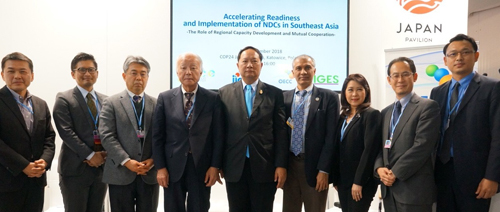Project News
2019-10-13
Convening of UNFCCC/COP24 Katowice Side Event

The Project co-hosted the Japan Pavilion Side Event "Accelerating Readiness and Implementation of NDCs in Southeast Asia - the Role of Regional Capacity Building and Mutual Cooperation -" at the margin of UNFCCC COP24 Katowice Conference together with Thailand Greenhouse Gas Management Organizations (TGO), Institute for Global Environmental Strategies (IGES), and Overseas Environmental Cooperation Center, Japan (OECC).
Taken into account the Parties to the Convention are in their transition phase to implement the Paris Agreement adopted at COP21 in December 2015, the Dialogue aimed at bringing together key stakeholders, public organization, development partners, regional organizations and global think tanks who are active in Southeast Asia, to collectively discuss how capacity development and international cooperation can be best shaped and achieved to facilitate further actions.
The Dialogue initiated with the keynote presentation by the Chairman of the Board of Directors of TGO highlighting the importance of regional collaboration through capacity building, followed by the introduction of the Climate Change International Technical Training Center (CITC) as the concrete example of regional capacity development endeavors. The subsequent panel discussion, co-facilitated by JICA and TGO, with the following three set of framing questions:
- Who are the primary provider of capacity building for implementation of climate actions?
- How should international cooperation and mutual partnership for capacity building be best structured?
- To what extent the outcomes of current capacity building endeavors are applied for implementation?
- Effective capacity building starts with solid understandings and assessment of needs, and it is ideal that the scope of such effort evolves over time from country-focused to regional, and towards inter-regional one. Selective and focused capacity building approach is necessary to respond to differentiated needs between climate change national focal point entities responsible for tracking progress and compilation of NDC implementation at national level, while sectoral agencies who are playing the key role for implementing specific policies and measures under their administrative jurisdiction.
- Highlighting the importance of south-south cooperation. TGO adopted progressive approach for south-south cooperation with Viet Nam and Lao PDR, starting with mutual understandings of overarching framework of national climate policies and measures through policy dialogue, followed by theme-specific focused dialogue (e.g. NDC, MRV, finance) to facilitate understandings of design and topics related to implementation.
- Regional cooperation for capacity building has its own intrinsic value. While Southeast Asia is diverse, regional cooperation facilitates mutual understanding of national circumstances and context, which serves as the basis for effective capacity building in the region.
- Following the experiences of WRI/NDC Partnership's contribution to support implementation of NDC in the region, importance of setting evidence-based targets, and capacity building for MRV through GHG Protocol highlighted. Engagement of private sector to ensure implementation of NDC also highlighted.
- Evaluation of capacity building is not simple, as the different methodological approach might be necessary depending on which layer and scope of the audiences capacity building is subjected to (national, local, individual). While the current evaluation approach is observed to be mostly input-/process-based (e.g. number of participants to capacity building), this may not be sufficient to capture how capacity are enhanced/built over time. Further effort is necessary to transform/establish evaluation approach towards output-/outcome-based (results-based).
The panel discussion identified the following take-away messages:
The session closed with shared recognition of the importance of the role of regional cooperation to respond to evolving nature and coverage associated with capacity building to facilitate climate actions in the context of post-2020 Paris Regime.
* NDC (Nationally Determined Contributions) stands for the national contributions pledged by Parties to the Convention to be implemented during Paris Agreement implementation phase, and NDC generally consists of mitigation in the form of national GHG emission reduction target and adaptation measures.
Opening Remark Dr. Kazuhiko TAKEUCHI
Chairman of the Board of Directors
Institute for Global Environmental Strategies (IGES)
Keynote Speech Dr. Kurujit Nakornthap
Chairman of the Board of Directors
Thailand Greenhouse Gas Management Organization
Panel Discussion
Co-Facilitators
Dr. Jakkanit KARUNARAK
Director of Capacity Building and Outreach Office TGO
Mr. Koji FUKUDA
Chief Advisor, JICA TA for Capacity Development to Accelerate Low Carbon and Resilient Society Realization in the Southeast Asian Region
Panelists
Dr. Natarika W. NITTIPON
Deputy Executive Director, TGO
Dr. Masato KAWANISHI
Senior Advisor on Climate Change, JICA
Mr.Pankaj BHATIA
World Resources Institute (WRI) / NDC Partnership
Mr. Makoto KATO
Principal Researcher, OECC
Closing Remark Mr. Murakami, Office for Climate Change
Japan International Cooperation Agency (JICA)
- About JICA
- News & Features
- Countries & Regions
- Our Work
- Thematic Issues
- Types of Assistance
- Partnerships with Other Development Partners
- Climate Change / Environmental and Social Considerations
- Evaluations
- Compliance and Anti-corruption
- Science and Technology Cooperation on Global Issues
- Research
- JICA Development Studies Program / JICA Chair
- Support for the Acceptance of Foreign HRs / Multicultural and Inclusive Community
- Publications
- Investor Relations
